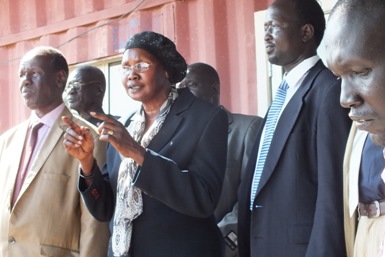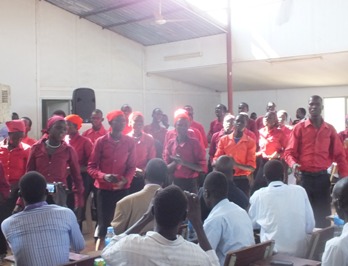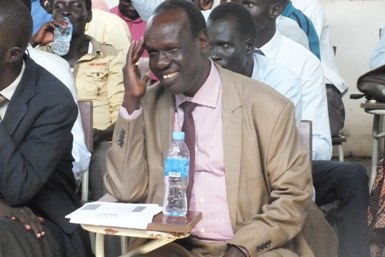Education key to progress in South Sudan
September 22, 2014 (BOR) – Quality education for all in South Sudan would help remedy the country’s political and economical crisis, as well as the pervasive xenophobia that continues to exists along tribal lines, said a well-known academic.

“Our AK-47 is our pen. If we are educated, we will not look at our marks (facial scarifications), and we will progess as a nation,” the vice-chancellor said.
She believed that through quality education, traditional mindsets mired in tribalism and prejudice could be changed as more people are able to analyse the pros and cons of their actions.
OPEN FOR STUDIES
Jonglei’s acting governor, Baba Medan, officially announced that the university would be open for lectures this week for the first semester of the 2014/2015 academic year.
Lectures will initially be opened to diploma students followed by degree program students at a later date.
Most of the university’s assets were either demolished or looted after violence erupted in the country in mid-December last year in the nation’s capital, Juba, before spreading to other areas.
Computers, printers and furniture were among the items looted, while offices and students hostels were also damaged.
The cost of replacing the replacing equipment will be shouldered by those with financial means.
Although large numbers of students completed their courses last year, they are still yet to receive their diplomas. This partly due to the crisis, as well as delays in the issuing of their national numbers at the ministry of higher education.

“Believe it or not, we are going to get them. We will award your diplomas and you will be able to compete for jobs,” she said.
The university administration had budgeted for 15 million South Sudanese pounds (SSP) to restore the university to full operation, but the funds have yet to be received from the national government.
Over 600 students are expected to resume their studies in Jonglei capital Bor, where the university was first established. The students from both degree and diploma programs will attend their courses in Bor.
CAMPAIGN FOR GIRLS’ EDUCATION
Jonglei episcopal church choir also performed at the event in front of the guests of honour, academics and the wider public in an attempt to highlight the weak status of girls in terms of access to both formal and informal education opportunities.
In their performances, the group called on stakeholders to encourage girls’ education, which they say will help effect wider change in communities.
Professor Robert M. K Deng, the deputy vice-chancellor for administration, appeared touched as he watched the performance.
However, he said while universities were committed to providing education for al, they continued to struggle due to the lack of resources and adequate funding.
“What we get from the government are salaries and we cannot run the university on salaries only. Where are we going to get the computers, fuel and the rest,” he said
FUNDING SUPPORT
Deng also expressed his appreciation for the help received from the state government, officials and international bodies to renovate damaged structures and replace some of the lost assets.
The state government has pledged 40,000 SSP to help support the reopening of the university, while the business community has agreed to supply 50,000 items of equipment, including mattresses and desktop computers
Deputy commander of military operations in Jonglei Major general Malual Majok also made a personal contribution of 10,000 SSP to the university.

The United Nations Mission in South Sudan (UNMISS) has started repairing university vehicles to help resolve a transportation crisis affecting academic staff.
Students attended in good numbers and those spoken to by Sudan Tribuneexpressed a willingness to begin their studies immediately.
Gay Malak, from the college of management sciences, said he was keen to resume his studies.
“This is good news to us. That is what we had been waiting for. Some of us never decided to go to Uganda or Kenya because we knew that if we are called back it might be difficult for us to come back on time,” said Gay.
“Those who left because of the crisis will still come back,” he added.
However, it remains unclear whether any of the Lou Nuer students who fled to neighbouring countries such as Uganda, Kenya or Ethiopia will make it back in time to resume their studies.
ASSURANCES OF ACCOUNTABILITY
Meanwhile, Duany said she would remain accountable for the funds received on behalf of the university.
“Look at myself, my cloths, do I have pockets? Accountability!” she said.
She said her administration would pool the available resources to establish key colleges of engineering and petroleum, wildlife and tourism and agriculture.
“Concentrating at the centre is a problem. This was the problem Sudan suffered from and now South Sudan. If we [have a ] college of fisheries in Fangak, the wildlife and tourism in Buma and [the] college of agriculture in Akobo, I think we shall beat everyone in South Sudan” she said.
(ST)
